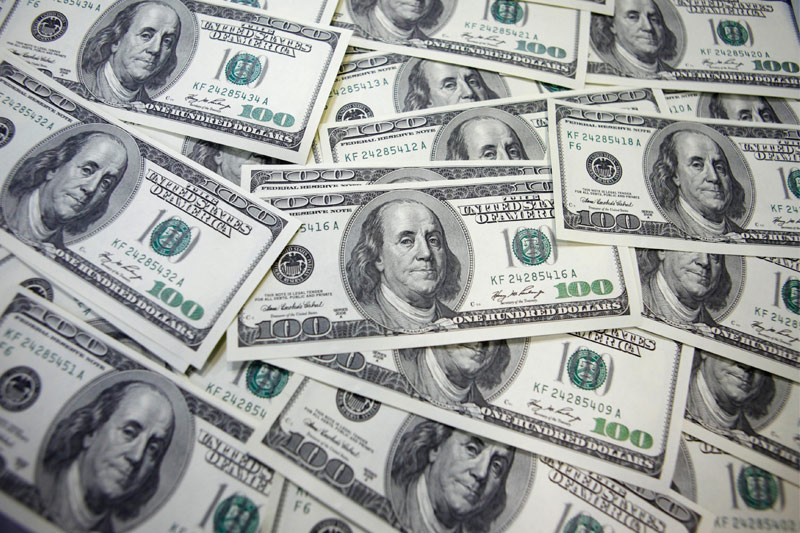Investing.com - The U.S. dollar added to gains against its major counterparts on Monday, as sentiment on the euro was hit by mounting concerns over political uncertainty in the euro zone following the collapse of Denmark’s government.
During U.S. morning trade, the dollar was higher against the euro, with EUR/USD shedding 0.67% to hit 1.3127.
Sentiment on the euro deteriorated after Dutch Prime Minister Mark Rutte’s government was forced to resign after negotiations on its austerity budget for 2013 broke down.
The news came one day after the first round of the French presidential election was won by Francois Hollande, who has pledged to challenge European leaders on their focus on austerity.
Meanwhile, concerns for the euro zone’s economic outlook weighed after data showed that the bloc’s manufacturing output slumped to its lowest level since June 2009 this month, while its services sector fell to a five month low.
The decline was driven by poor performances in Germany and France, with manufacturing activity in Germany slowing to the lowest level in almost three years.
The weak data fuelled fears economic growth in the region will be hit by planned government austerity measures.
The greenback was also higher against the pound, with GBP/USD sliding 0.17% to hit 1.3129.
The pound remained supported after data on Friday showed that U.K. retail sales posted the biggest jump in over a year in March, fuelling hopes that the economic recovery is gaining momentum and dampening expectations for a fresh round of monetary stimulus from the Bank of England.
Elsewhere, the greenback was lower against the yen but pushed higher against the Swiss franc, with USD/JPY dropping 0.49% to hit 81.11 and USD/CHF advancing 0.80% to hit 0.9161.
The greenback strengthened against its Canadian, Australian and New Zealand counterparts, with USD/CAD gaining 0.42% to hit 0.9962, AUD/USD falling 0.91% to hit 1.0284 and NZD/USD tumbling 1.01% to hit 0.8103.
In Australia, official data showed that producer price inflation fell unexpectedly in the first quarter, fuelling expectations for a rate cut by the Reserve Bank of Australia at its policy meeting next week.
Elsewhere, official data showed that Canadian wholesale sales rose unexpectedly in February, rebounding from the previous month’s steep decline.
The dollar index, which tracks the performance of the greenback versus a basket of six other major currencies, was up 0.49% at 79.66.
Also Monday, the Bank of Spain said it believes that the country’s economy has entered a recession.
The central bank said gross domestic product contracted by 0.4% in the three months to March. That follows a 0.3% contraction in the fourth quarter, and zero growth in the third quarter of last year.
During U.S. morning trade, the dollar was higher against the euro, with EUR/USD shedding 0.67% to hit 1.3127.
Sentiment on the euro deteriorated after Dutch Prime Minister Mark Rutte’s government was forced to resign after negotiations on its austerity budget for 2013 broke down.
The news came one day after the first round of the French presidential election was won by Francois Hollande, who has pledged to challenge European leaders on their focus on austerity.
Meanwhile, concerns for the euro zone’s economic outlook weighed after data showed that the bloc’s manufacturing output slumped to its lowest level since June 2009 this month, while its services sector fell to a five month low.
The decline was driven by poor performances in Germany and France, with manufacturing activity in Germany slowing to the lowest level in almost three years.
The weak data fuelled fears economic growth in the region will be hit by planned government austerity measures.
The greenback was also higher against the pound, with GBP/USD sliding 0.17% to hit 1.3129.
The pound remained supported after data on Friday showed that U.K. retail sales posted the biggest jump in over a year in March, fuelling hopes that the economic recovery is gaining momentum and dampening expectations for a fresh round of monetary stimulus from the Bank of England.
Elsewhere, the greenback was lower against the yen but pushed higher against the Swiss franc, with USD/JPY dropping 0.49% to hit 81.11 and USD/CHF advancing 0.80% to hit 0.9161.
The greenback strengthened against its Canadian, Australian and New Zealand counterparts, with USD/CAD gaining 0.42% to hit 0.9962, AUD/USD falling 0.91% to hit 1.0284 and NZD/USD tumbling 1.01% to hit 0.8103.
In Australia, official data showed that producer price inflation fell unexpectedly in the first quarter, fuelling expectations for a rate cut by the Reserve Bank of Australia at its policy meeting next week.
Elsewhere, official data showed that Canadian wholesale sales rose unexpectedly in February, rebounding from the previous month’s steep decline.
The dollar index, which tracks the performance of the greenback versus a basket of six other major currencies, was up 0.49% at 79.66.
Also Monday, the Bank of Spain said it believes that the country’s economy has entered a recession.
The central bank said gross domestic product contracted by 0.4% in the three months to March. That follows a 0.3% contraction in the fourth quarter, and zero growth in the third quarter of last year.
